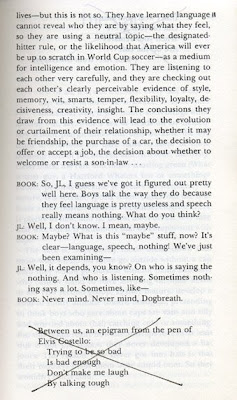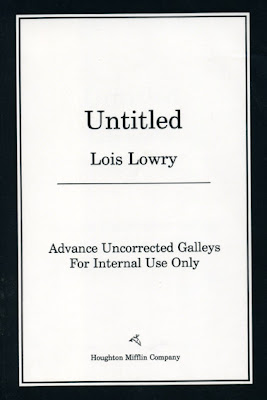The better the author, the bigger the mess.
You may recall my earlier blog entry about sending my non-reading brother to get Robert Cormier's autograph.
Then I attended a book signing for the brilliant Australian writer Markus Zusak and made the mistake of asking about his dog, who appeared so notably in many of his novels and book dedications.
...How was I to know the dog had DIED???
Last summer I attended an event for Gary Schmidt, an equally brilliant author whose WEDNESDAY WARS was my personal choice for the 2008 Newbery. In a wide-ranging speech, which touched on how he came to create that novel, his research on its sixties setting, and his ambivalent feelings when his son decided to join the military, he happened to mention that, as he drove from his rural, bucolic town to the metro-Detroit area, he couldn't help but notice all the fast-food, drive-thru, quick eating places in the metropolitan area. Why did everything have to be so fast these days, he wondered? Why the need for instant gratification? (I quickly changed my plans to stop at Taco Bell on the way home.) At the signing afterward, I handed over my copies of THE WEDNESDAY WARS, a couple of biographies he'd written on Robert Lawson and Robert McCloskey, and the literary anthologies about the four seasons he'd edited (very browsable books, and highly recommended!) But the one thing he zeroed in on was the ARC of THE WEDNESDAY WARS.
ARCs: Advance Reading Copies. Galleys. Proofs. Prepubs. Whatever you call them, they're controversial. Produced several months before a book is published, they are distributed to critics and librarians, who need to write reviews and make recommendations before a book's actual publication date. Increasingly, they are also sought by collectors like me.

Mr. Schmidt picked up my ARC and said, "I noticed a lot of people with these. Where do they get them from?"
"Um...sometimes eBay," I said.
"Why do they want them?" he asked.
Well, I knew the main reason I'd purchased mine. I wanted to read the book early -- several months before it hit the bookstores. But how was I to explain that kind of thinking to someone who'd just spent five minutes complaining about how instant gratification was ruining our society? It's true, I could have have just waited six months till the real book was available. But no, I had to take the "fast food" approach to reading! (If a hardcover book is a fancy dinner at a gourmet restaurant, an ARC is probably comparable to a McDonald's Happy Meal: cheaply made, inexpensive, and tasty -- but not equivalent to The Real Thing.)
I can't remember exactly how I answered Mr. Schmidt's question. Probably with one of those signature comments ("Uh...um...I dunno.") that make me such a scintillating conversationalist and in-demand dinner-party guest. Ah well, at least he signed my ARC:

In retrospect, I wish I'd had the presence of mind to explain things a little better. As I mentioned earlier, advance reading copies have become increasingly controversial in recent years. I know of one young adult author who goes into a rampage when this topic is discussed. She thinks that ARCs are produced ONLY for reviewers, librarians, and industry-type people and that anyone else who gets their hands on one is basically stealing money from her -- because they are reading her work FOR FREE instead of BUYING her book. She even tries to prevent book dealers from selling ARCs on the internet. I think she needs to get a life. I've never seen her complain about people who borrow her books from the library instead of purchasing them. Besides, most people who take the time and make the effort to track down an ARC are serious book collectors who will ALSO buy the hardcover when it's released. I know I almost always do.
What, exactly, is the purpose of getting an ARC?
Well, with apologies to Gary Schmidt, sometimes it is instant gratification -- just the desire to read the latest book by a favorite author as soon as possible. (It's actually a compliment to an author when someone is that anxious to read their forthcoming book.) And it's a neat feeling to be, as someone once described it, "first on the block," to read a new book, forming your own opinions before magazine reviews have appeared to influence you.
From a collecting perspective, it also comes back to the idea of getting the copy that's "closest" to the author's original creation. (The same rationale is used to explain the preference for a first edition over a second edition.)
Serious readers like to compare ARCs to the finished product to see if there have been any last minute changes in the text. A few years ago I encountered the ARC of a children's book set during Easter week in which the Wednesday before Easter was repeatdly referred to as "Ash Wednesday" throughout the text, including in chapter headers. I wondered how the author could write an entire book on the subject and not know any better. And where were the editor and copyeditors during the book's production? (This mistake was fixed in the hardcover edition.) I just read an ARC of a forthcoming novel that included a separate sheaf of pages labeled "Chapter One" to replace the original chapter bound within the ARC. Of course it was intriguing to compare the two and figure out why the writer and editor had decided to make those last-minute changes.
It's also fascinating to see how cover illustrations can change between the time the ARC and the hardcover are released. Here's the ARC and the harcover illustrations for THE GREEN GLASS SEA by Ellen Klages, my favorite shoulda-won-the-Newbery title of 2006:

Why do you think the change was made? Which cover is more attractive to you? (By the way,the mathematial inscriptions appear in glossy print all across the hardcover jacket, though my scanner didn't quite pick that up.) Some ARC readers thought the girl on the original cover looked distractingly like Anne Frank, though I don't know if that's why the cover was eventually changed.
Here's a fun note that I found in Bruce Brooks' deft nonfiction volume BOYS WILL BE. Apparently he included it in his typescript as a side comment to editor Marc Aronson, but it accidentally got printed in the ARC. It was crossed out before the ARC was sent to reviewers. We collectors love this kind of thing.

Finally, for those authors who say they can't start a new story or novel until they know the title, here's evidence that books sometimes go through the entire publishing process and are even printed in ARC format before a title is finalized:

"Untitled" eventually became THE SILENT BOY, one of my personal Lois Lowry favorites. I was surprised to discover how many ARCs are printed as "Untitled." Any collector who wanted to start an unusual collection could find literally hundreds of ARC with this title on the front cover.
ARCs, galleys, proofs, prepubs...whatever you call them, I am always interested in looking at them for the insights they provide into the creative process.
2 comments:
To get you even crazier, an earlier ARC than yours for The Wednesday Wars had a slightly different cover. (The two faces were intertwined or something --- I've got that one at school so can't check.)
The permanence of the internet makes this kind of joke even more amusing. I just saw this today, and it wasn't until the photo was MENTIONED in the post that I looked at it closely and scrolled back up to the date to see if it was an AF.
Post a Comment